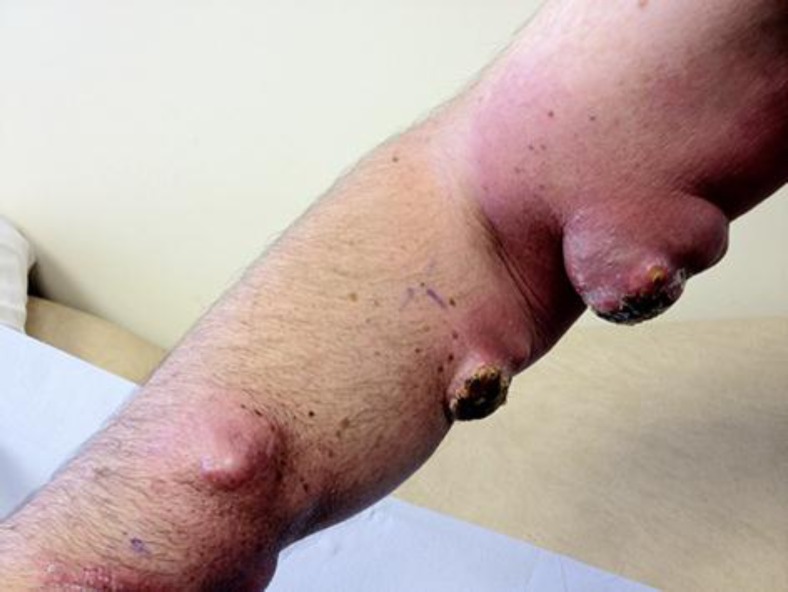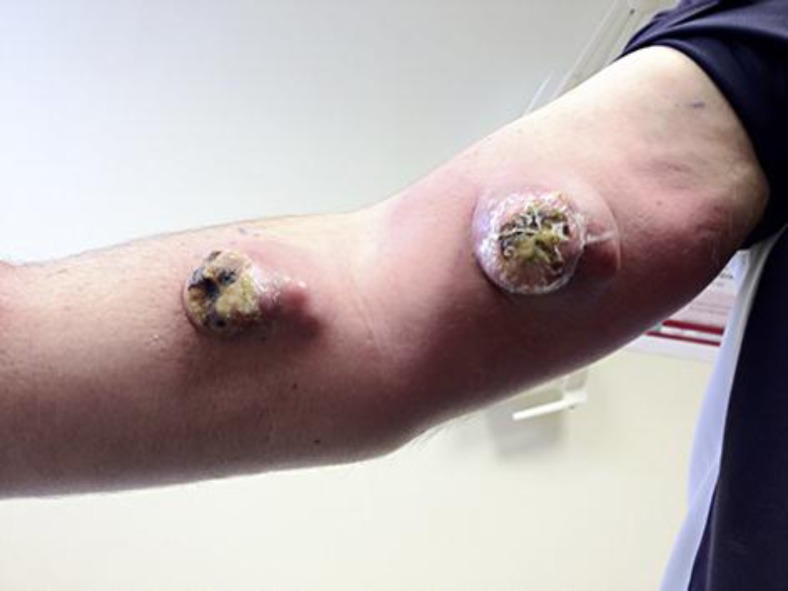Abstract
Introduction
Over the past year, 3 agents have been approved for the treatment of melanoma by the Food and Drug Administration. These include pegylated interferon α-2b for stage III melanoma, vemurafenib for unresectable or metastatic melanoma with BRAF V600E mutation, and ipilimumab for unresectable or metastatic melanoma.
Case Presentation
We present here the case of a 65-year-old Caucasian male diagnosed with advanced melanoma in April 2011 and treated with ipilimumab (Yervoy®), a monoclonal antibody targeting cytotoxic T-lymphocyte-associated antigen 4 (CTLA-4), as second-line treatment after progression with dacarbazine, for (wild-type BRAF) metastatic melanoma. The patient was referred to us for several painful lumps on his right arm. A biopsy of one of them revealed melanoma. CT and PET scans did not show any other lesions or a primary site. The patient was started on first-line chemotherapy with dacarbazine 850 mg/m2 on day 1, every 3 weeks. After 3 cycles, the patient showed disease progression with an increase in size of the skin metastasis. Second-line treatment was started with ipilimumab 3 mg/kg on day 1, every 3 weeks. At the end of the treatment, after 4 cycles, we documented a complete clinical response with total resolution of the skin metastasis. At the time of writing this paper, our patient had finished his treatment more than 9 months earlier and is still in complete remission.
Conclusion
This is a paradigmatic case where, despite extensive metastatic disease, treatment with ipilimumab has confirmed its efficacy. It is still an open question why only a minority of patients have such a remarkable response, and further trials are warranted to address this important question.
Key words: Melanoma, Ipilimumab, Complete response
Introduction
About 200,000 cases of melanoma are diagnosed and 48,000 melanoma-related deaths occur worldwide each year [1]. Among cancers in patients under 40 years of age, the incidence of melanoma is second only to that of breast cancer in women and leukemia in men [2].
Since 2010, a real breakthrough has occurred in advanced melanoma therapy that had been anticipated for decades. Molecular targeted therapy has been added to the treatment regimen of this disease. Before 2010, no systemic therapy had been shown to improve overall survival among patients with metastatic melanoma. Ipilimumab, a monoclonal antibody targeting cytotoxic T-lymphocyte-associated antigen 4 (CTLA-4), and vemurafenib, a selective BRAF inhibitor, have both been shown to improve survival among patients with metastatic melanoma in randomized trials [3, 4, 5].
Here, we present the case of a 65-year-old Caucasian male diagnosed with advanced melanoma in April 2011 and treated with ipilimumab, after dacarbazine failed, for (wildtype BRAF) metastatic disease.
Case Report
The patient was referred to us in April 2011, presenting with several painful exophytic lesions on his right arm (fig. 1, fig. 2). There was no medical history of previous cancer and/or melanoma. An initial CT scan was followed by a PET scan. No evidence of any primary tumors was found despite confirmation of multiple lumps in his right arm. A biopsy was carried out and revealed wild-type BRAF malignant melanoma.
Fig. 1.
Right arm, skin metastasis at presentation.
Fig. 2.
Right arm, skin metastasis at presentation.
The patient was started on dacarbazine 850 mg/m2 on day 1, every 3 weeks, but after 3 cycles he experienced disease progression with nearly all previous lesions increasing in size and a new one popping up. He was then started on ipilimumab 3 mg/kg and, after the whole treatment consisting of 4 cycles, which he tolerated very well, he achieved a complete clinical (fig. 3, fig. 4) and radiological response. The latest CT scan (performed at the end of March 2013) did not show any metastatic disease.
Fig. 3.
Right arm, complete clinical response at the end of the treatment.
Fig. 4.
Right arm, complete clinical response at the end of the treatment.
Molecular targeted therapies (e.g. BRAF inhibitors) have reached high response rates but, unfortunately, rather short response duration (progression-free survival: 6 months), while immunotherapy has shown slower but more durable results [6]. Attia et al. [7] reported that ipilimumab (3 mg/kg every 3 weeks or an initial dose of 3 mg/kg then 1 mg/kg every 3 weeks) plus a peptide vaccine resulted in 2 complete responses and 5 partial responses among 56 patients with progressive stage IV melanoma. It is rare but not impossible to achieve a complete response, and some patients are currently in a state of complete response. To date, our patient has been free from cancer for 9 months.
Written informed consent was obtained from the patient for publication of this work and accompanying images. A copy of the written consent form is available for review from the editor-in-chief of this journal.
Conclusion
This is a paradigmatic case where, despite extensive metastatic disease, the treatment with ipilimumab has confirmed its efficacy. It is still an open question why only a minority of patients have such a remarkable response, and further trials are warranted to address this important question. Understanding the biology of melanoma is crucial for an accurate selection of patients who will be more likely to benefit from ipilimumab.
Disclosure Statement
The authors declare that they have no competing interests.
References
- 1.International Agency for Research on Cancer . Lyon: IARC Press; 2008. World Cancer Report 2008. [Google Scholar]
- 2.Siegel R, Naishadham D, Jemal A. Cancer statistics, 2012. CA Cancer J Clin. 2012;62:10–29. doi: 10.3322/caac.20138. [DOI] [PubMed] [Google Scholar]
- 3.Robert C, Thomas L, Bondarenko I, et al. Ipilimumab plus dacarbazine for previously untreated metastatic melanoma. N Engl J Med. 2011;364:2517–2526. doi: 10.1056/NEJMoa1104621. [DOI] [PubMed] [Google Scholar]
- 4.Hodi FS, O'Day SJ, McDermott DF, et al. Improved survival with ipilimumab in patients with metastatic melanoma. N Engl J Med. 2010;363:711–723. doi: 10.1056/NEJMoa1003466. erratum in N Engl J Med 2010;363:1290. [DOI] [PMC free article] [PubMed] [Google Scholar]
- 5.Chapman PB, Hauschild A, Robert C, et al. Improved survival with vemurafenib in melanoma with BRAF V600E mutation. N Engl J Med. 2011;364:2507–2516. doi: 10.1056/NEJMoa1103782. [DOI] [PMC free article] [PubMed] [Google Scholar]
- 6.Livingstone E, Zimmer L, Vaubel J, Schadendorf D. Current advances and perspectives in the treatment of advanced melanoma. J Dtsch Dermatol Ges. 2012;10:319–325. doi: 10.1111/j.1610-0387.2012.07895.x. [DOI] [PubMed] [Google Scholar]
- 7.Attia P, Phan GQ, Maker AV, et al. Autoimmunity correlates with tumor regression in patients with metastatic melanoma treated with anti-cytotoxic T-lymphocyte antigen-4. J Clin Oncol. 2005;23:6043–6053. doi: 10.1200/JCO.2005.06.205. [DOI] [PMC free article] [PubMed] [Google Scholar]






